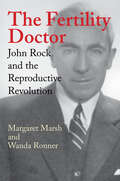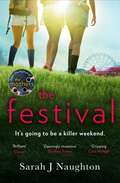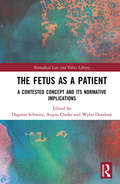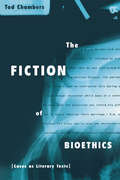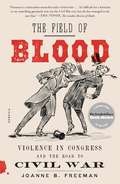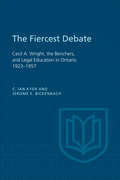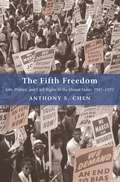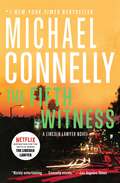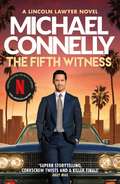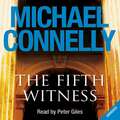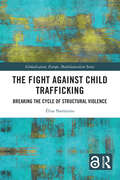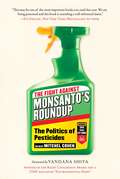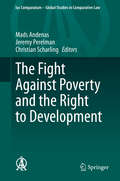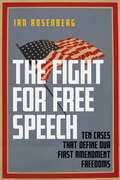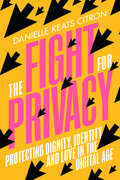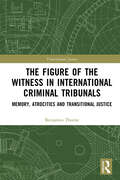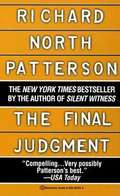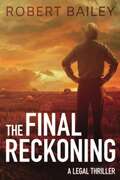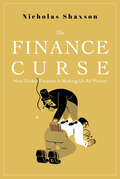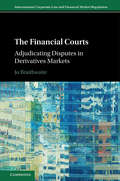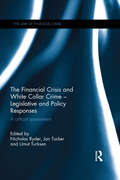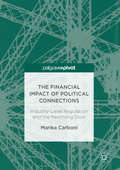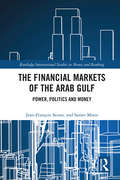- Table View
- List View
The Fertility Doctor: John Rock and the Reproductive Revolution
by Margaret Marsh Wanda RonnerAs Louise Brown—the first baby conceived by in vitro fertilization—celebrates her 30th birthday, Margaret Marsh and Wanda Ronner tell the fascinating story of the man who first showed that human in vitro fertilization was possible.John Rock spent his career studying human reproduction. The first researcher to fertilize a human egg in vitro in the 1940s, he became the nation’s leading figure in the treatment of infertility, his clinic serving rich and poor alike. In the 1950s he joined forces with Gregory Pincus to develop oral contraceptives and in the 1960s enjoyed international celebrity for his promotion of the pill and his campaign to persuade the Catholic Church to accept it. Rock became a more controversial figure by the 1970s, as conservative Christians argued that his embryo studies were immoral and feminist activists contended that he had taken advantage of the clinic patients who had participated in these studies as research subjects. Marsh and Ronner’s nuanced account sheds light on the man behind the brilliant career. They tell the story of a directionless young man, a saloon keeper’s son, who began his working life as a timekeeper on a Guatemalan banana plantation and later became one of the most recognized figures of the twentieth century. They portray his medical practice from the perspective of his patients, who ranged from the wives of laborers to Hollywood film stars.The first scholars to have access to Rock’s personal papers, Marsh and Ronner offer a compelling look at a man whose work defined the reproductive revolution, with its dual developments in contraception and technologically assisted conception.
The Festival
by Sarah J. NaughtonFROM THE NUMBER ONE BESTSELLING AUTHOR'Dazzlingly inventive'Sunday Times'Gripping and powerful'Cara Hunter**********FOUR WOMEN.Orly, Lenny, Mel and Thea have been best friends since school. But now it is 20 years later and inevitably they have drifted apart.ONE WEEKEND.It is Lenny's 40th birthday, plus Orly and Mel need cheering up, so Thea suggests a weekend away at a festival in their hometown. It's a chance for them all to reconnect. NOT ALL OF THEM WILL SURVIVE.But their holiday soon takes a sinister turn, and not all of the friends will leave the festival alive...
The Fetus as a Patient: A Contested Concept and its Normative Implications (Biomedical Law and Ethics Library)
by Dagmar Schmitz Angus Clarke Wybo DondorpDue to new developments in prenatal testing and therapy the fetus is increasingly visible, examinable and treatable in prenatal care. Accordingly, physicians tend to perceive the fetus as a patient and understand themselves as having certain professional duties towards it. However, it is far from clear what it means to speak of a patient in this connection. This volume explores the usefulness and limitations of the concept of ‘fetal patient’ against the background of the recent seminal developments in prenatal or fetal medicine. It does so from an interdisciplinary and international perspective. Featuring internationally recognized experts in the field, the book discusses the normative implications of the concept of ‘fetal patient’ from a philosophical-theoretical as well as from a legal perspective. This includes its implications for the autonomy of the pregnant woman as well as its consequences for physician-patient-interactions in prenatal medicine.
The Fiction of Bioethics (Reflective Bioethics)
by Tod ChambersTod Chambers suggests that literary theory is a crucial component in the complete understanding of bioethics. The Fiction of Bioethics explores the medical case study and distills the idea that bioethicists study real-life cases, while philosophers contemplate fictional accounts.
The Field of Blood: Violence in Congress and the Road to Civil War
by Joanne B. FreemanIn The Field of Blood, Joanne B. Freeman recovers the long-lost story of physical violence on the floor of the U.S. Congress. Drawing on an extraordinary range of sources, she shows that the Capitol was rife with conflict in the decades before the Civil War. <p><p> Legislative sessions were often punctuated by mortal threats, canings, flipped desks, and all-out slugfests. When debate broke down, congressmen drew pistols and waved Bowie knives. One representative even killed another in a duel. Many were beaten and bullied in an attempt to intimidate them into compliance, particularly on the issue of slavery. <p> These fights didn’t happen in a vacuum. Freeman’s dramatic accounts of brawls and thrashings tell a larger story of how fisticuffs and journalism, and the powerful emotions they elicited, raised tensions between North and South and led toward war. In the process, she brings the antebellum Congress to life, revealing its rough realities—the feel, sense, and sound of it—as well as its nation-shaping import. <p> Funny, tragic, and rivetingly told, The Field of Blood offers a front-row view of congressional mayhem and sheds new light on the careers of John Quincy Adams, Henry Clay, and other luminaries, as well as introducing a host of lesser-known but no less fascinating men. The result is a fresh understanding of the workings of American democracy and the bonds of Union on the eve of their greatest peril.
The Fiercest Debate: Cecil A Wright, the Benchers, and Legal Education in Ontario 1923-1957
by Jerome Bickenbach C. KyerFrom its earliest days the Law Society of Upper Canada adhered to the traditions of English legal practice and education. In the 1930s and 1940s, however, some of the most cherished of those traditions were challenged in a bitter debate about the nature of legal education in Ontario. This book tells the story of that debate and one of its leading participants, Cecil Augustus Wright. 'Caesar' Wright was one of the first Canadian legal academics to attend Harvard Law School, and his Harvard background played a significant role in the development of his position in the controversy over legal education. The established lawyers who served as benchers of the law society insisted that legal training should be principally a matter of practical experience. Wright, who sought to bring American notions of the roles of lawyers and legal academic to Ontario, tried unsuccessfully to persuade the benchers that the job of educating young lawyers should be transferred to the universities. Decades of contention culminated in 1949 with Wright's dramatic resignation from Osgoode Hall Law School and his appointment as dean of the newly created Faculty of Law at the University of Toronto. The debate between the benchers of the law society and the proponents of academic legal education touched the lives of many prominent lawyers and law professors, and its resolution permanently changed the nature of legal education in Ontario. Ian Kyer and Jerome Bickenbach offer an account of the conflict and a portrait of the energetic and often acerbic figure who has been called Canada's most influential law teacher.
The Fifth Freedom: Jobs, Politics, and Civil Rights in the United States, 1941-1972 (Princeton Studies in American Politics: Historical, International, and Comparative Perspectives #106)
by Anthony S. ChenWhere did affirmative action in employment come from? The conventional wisdom is that it was instituted during the Johnson and Nixon years through the backroom machinations of federal bureaucrats and judges. The Fifth Freedom presents a new perspective, tracing the roots of the policy to partisan conflicts over fair employment practices (FEP) legislation from the 1940s to the 1970s. Drawing on untapped sources, Anthony Chen chronicles the ironic, forgotten role played by American conservatives in the development of affirmative action. Decades before affirmative action began making headlines, millions of Americans across the country debated whether government could and should regulate job discrimination. On one side was an interfaith and interracial bloc of liberals, who demanded FEP legislation that would establish a centralized system for enforcing equal treatment in the labor market. On the other side was a bloc of business-friendly, small-government conservatives, who felt that it was unwise to "legislate tolerance" and who made common cause with the conservative wing of the Republican party. Conservatives ultimately prevailed, but their obstruction of FEP legislation unintentionally facilitated the rise of affirmative action, a policy their ideological heirs would find even more abhorrent. Broadly interdisciplinary, The Fifth Freedom sheds new light on the role of parties, elites, and institutions in the policymaking process; the impact of racial politics on electoral realignment; the history of civil rights; the decline of New Deal liberalism; and the rise of the New Right.Some images inside the book are unavailable due to digital copyright restrictions.
The Fifth Witness (A Lincoln Lawyer Novel #4)
by Michael ConnellyIn this #1 New York Times bestselling thriller, after taking on a foreclosure case, defense attorney Mickey Haller fights to prove his client&’s innocence—but first he must follow a trail of black market evidence to its sinister end. Inspiration for the #1 Netflix series The Lincoln Lawyer. Mickey Haller has fallen on tough times. He expands his business into foreclosure defense, only to see one of his clients accused of killing the banker she blames for trying to take away her home. Mickey puts his team into high gear to exonerate Lisa Trammel, even though the evidence and his own suspicions tell him his client is guilty. Soon after he learns that the victim had black market dealings of his own, Haller is assaulted, too—and he's certain he's on the right trail. Despite the danger and uncertainty, Haller mounts the best defense of his career in a trial where the last surprise comes after the verdict is in. Connelly proves again why he "may very well be the best novelist working in the United States today" (San Francisco Chronicle).
The Fifth Witness (A\lincoln Lawyer Novel Ser. #4)
by Michael ConnellyA blistering courtroom drama featuring THE LINCOLN LAWYER’s Mickey Haller from the master of the genre. In tough times, crime is one of the few things that still pays, but if defense attorney Mickey Haller was expecting an uptick in business during the economic downturn, the reality is a different story. Even people needing legal representation to keep them out of jail are having to make cut-backs, it seems. In fact, the most significant part of Mickey’s business right now is not about keeping clients out of jail but about keeping a roof over their heads, as the foreclosure boom hits thousands of people who were granted unrealistic mortgages in the good times and now face being kicked to the curb by ruthless corporations. Lisa Trammel had been a client of Mickey’s for eight months – his very first foreclosure case, in fact – and although so far he’d managed to stop the bank from taking her house, the strain and sense of injustice are beginning to take their toll, and the bank had recently got a restraining order to prevent her protesting against their fraudulent practices. But now the bank’s CEO, Mitchell Bondurant, has been found in the bank’s car park with a bullet in his brain, and Lisa is about to be indicted for murder. For Mickey, it’s back to what he does best on the biggest stage of all, but if he thought defending Lisa Trammel was going to be a walk in the park, he’d be wrong. Not only is he about to learn some startling truths about his client, but also about himself, and by the time the verdict is in, Mickey’s whole world will have been turned upside down.
The Fifth Witness (Mickey Haller Series #4)
by Michael ConnellyIn tough times, crime is one of the few things that still pays, but even criminals are having to make cut-backs. So for defence lawyer Mickey Haller, most of his new business is not about keeping people out of jail; it's about keeping a roof over their heads as the foreclosure business is booming.Lisa Trammel has been a client of Mickey's for eight months, and so far he's stopped the bank from taking her house. But now the bank's CEO has been found beaten to death - and Lisa is about to be indicted for murder...Read by Peter Giles(p) 2011 Hachette Audio
The Fifth Witness: The Bestselling Thriller Behind Netflix’s The Lincoln Lawyer Season 2 (Mickey Haller Series #4)
by Michael ConnellyA blistering courtroom drama featuring The Lincoln Lawyer's Mickey Haller from the master of the genre.In tough times, crime is one of the few things that still pays, but even criminals are having to make cutbacks. So for defence lawyer Mickey Haller, most of his new business is not about keeping people out of jail; it's about keeping a roof over their heads as the foreclosure business is booming.Lisa Trammel has been a client of Mickey's for eight months, and so far he's stopped the bank from taking her house. But now the bank's CEO has been found beaten to death - and Lisa is about to be indicted for murder . . .
The Fight Against Child Trafficking: Breaking the Cycle of Structural Violence (Globalisation, Europe, and Multilateralism)
by Élisa NarminioThis book analyses the contemporary effects of anti-trafficking policies on children trafficked for labour. It explores different dimensions of private and public apparatuses through which the governmentality of child trafficking manifests itself at a regional and interregional level. It investigates questions linked to the diffusion of the child trafficking norm between and within regions and stakeholders; to the criminalisation and vulnerabilisation of child traffickees; and to private governance of anti-trafficking initiatives, in particular concerning social sustainability of business supply chains. Drawing on extensive fieldwork with government, police, justice, civil society, multilateral organizations and businesses in the EU and in the ASEAN, the book argues that child traffickees are subjected not only to physical and psychological violence, but also to structural violence. The book concludes with suggestions to improve current anti-trafficking regimes. This book will be of key interest to scholars, students and practitioners in EU Studies, Southeast Asian Studies, Regionalism, Human Rights, Law, International Relations, and International Political Economy.
The Fight Against Monsanto's Roundup: The Politics of Pesticides
by Vandana Shiva Mitchel CohenA Comprehensive Look at the Worldwide Battle to Defend Ourselves and Our Environment Against the Peddlers of Chemical Poisons Chemical poisons have infiltrated all facets of our lives – housing, agriculture, work places, sidewalks, subways, schools, parks, even the air we breathe. More than half a century since Rachel Carson issued Silent Spring – her call-to-arms against the poisoning of our drinking water, food, animals, air, and the natural environment – The Fight Against Monsanto's Roundup takes a fresh look at the politics underlying the mass use of pesticides and the challenges people around the world are making against the purveyors of poison and the governments that enable them. The scientists and activists contributing to The Fight Against Monsanto's Roundup, edited by long-time Green activist Mitchel Cohen, explore not only the dangers of glyphosate – better known as “Roundup” – but the campaign resulting in glyphosate being declared as a probable cancer-causing agent. In an age where banned pesticides are simply replaced with newer and more deadly ones, and where corporations such as Monsanto, Bayer, Dow and DuPont scuttle attempts to regulate the products they manufacture, what is the effective, practical, and philosophical framework for banning glyphosate and other pesticides?The Fight Against Monsanto's Roundup: The Politics of Pesticides takes lessons from activists who have come before and offers a radical approach that is essential for defending life on this planet and creating for our kids, and for ourselves, a future worth living in.
The Fight Against Poverty and the Right to Development (Ius Comparatum - Global Studies in Comparative Law #52)
by Mads Andenas Jeremy Perelman Christian ScharlingThis book conducts a comparative legal study from two analytical points of view. First, it accounts for the legal dimensions of the fight against poverty and the right to development as seen from the perspective of domestic legal law. It examines the domestic legal tools, such as constitutional law, that aim to contribute to the fight against poverty and the right to development. Second, the book accounts for the domestic contributions to the international legal framework and examines cross-cutting themes of the contemporary state-of-play on the fight against poverty more broadly and of the right to development. The book consists of several national and thematic reports, which look at these issues from either a national or a thematic perspective. Its first chapter is a general report, which draws on the national and thematic reports to compare, systematize and question the contemporary features at play within the field of the fight against poverty and the right to development.
The Fight for Free Speech: Ten Cases That Define Our First Amendment Freedoms
by Ian RosenbergA user’s guide to understanding contemporary free speech issues in the United StatesAmericans today are confronted by a barrage of questions relating to their free speech freedoms. What are libel laws, and do they need to be changed to stop the press from lying? Does Colin Kaepernick have the right to take a knee? Can Saturday Night Live be punished for parody? While citizens are grappling with these questions, they generally have nowhere to turn to learn about the extent of their First Amendment rights. The Fight for Free Speech answers this call with an accessible, engaging user’s guide to free speech. Media lawyer Ian Rosenberg distills the spectrum of free speech law down to ten critical issues. Each chapter in this book focuses on a contemporary free speech question—from student walkouts for gun safety to Samantha Bee’s expletives, from Nazis marching in Charlottesville to the muting of adult film star Stormy Daniels— and then identifies, unpacks, and explains the key Supreme Court case that provides the answers. Together these fascinating stories create a practical framework for understanding where our free speech protections originated and how they can develop in the future. As people on all sides of the political spectrum are demanding their right to speak and be heard, The Fight for Free Speech is a handbook for combating authoritarianism, protecting our democracy, and bringing an understanding of free speech law to all.
The Fight for Privacy: Protecting Dignity, Identity, and Love in the Digital Age
by Danielle Keats CitronThe essential road map for understanding—and defending—your right to privacy in the twenty-first century. Privacy is disappearing. From our sex lives to our workout routines, the details of our lives once relegated to pen and paper have joined the slipstream of new technology. As a MacArthur fellow and distinguished professor of law at the University of Virginia, acclaimed civil rights advocate Danielle Citron has spent decades working with lawmakers and stakeholders across the globe to protect what she calls intimate privacy—encompassing our bodies, health, gender, and relationships. When intimate privacy becomes data, corporations know exactly when to flash that ad for a new drug or pregnancy test. Social and political forces know how to manipulate what you think and who you trust, leveraging sensitive secrets and deepfake videos to ruin or silence opponents. And as new technologies invite new violations, people have power over one another like never before, from revenge porn to blackmail, attaching life-altering risks to growing up, dating online, or falling in love. A masterful new look at privacy in the twenty-first century, The Fight for Privacy takes the focus off Silicon Valley moguls to investigate the price we pay as technology migrates deeper into every aspect of our lives: entering our bedrooms and our bathrooms and our midnight texts; our relationships with friends, family, lovers, and kids; and even our relationship with ourselves. Drawing on in-depth interviews with victims, activists, and advocates, Citron brings this headline issue home for readers by weaving together visceral stories about the countless ways that corporate and individual violators exploit privacy loopholes. Exploring why the law has struggled to keep up, she reveals how our current system leaves victims—particularly women, LGBTQ+ people, and marginalized groups—shamed and powerless while perpetrators profit, warping cultural norms around the world. Yet there is a solution to our toxic relationship with technology and privacy: fighting for intimate privacy as a civil right. Collectively, Citron argues, citizens, lawmakers, and corporations have the power to create a new reality where privacy is valued and people are protected as they embrace what technology offers. Introducing readers to the trailblazing work of advocates today, Citron urges readers to join the fight. Your intimate life shouldn’t be traded for profit or wielded against you for power: it belongs to you. With Citron as our guide, we can take back control of our data and build a better future for the next, ever more digital, generation.
The Fight over Digital Rights
by Bill D. HermanIn the political fight over copyright, Internet advocacy has reshaped the playing field. This was shown in the 2012 'SOPA blackout', when the largest online protest in history stopped two copyright bills in their tracks. This protest was the culmination of an intellectual and political evolution more than a decade in the making. This book examines the debate over digital copyright, from the late 1980s through early 2012, and the new tools of political communication involved in the advocacy around the issue. Drawing on methods from legal studies, political science and communications, it explores the rise of a coalition seeking more limited copyright, as well as how these early-adopting, technology-savvy policy advocates used online communication to shock the world. It compares key bills, congressional debates, and offline and online media coverage using quantitative and qualitative methods to create a rigorous study for researchers that is also accessible to a general audience.
The Figure of the Witness in International Criminal Tribunals: Memory, Atrocities and Transitional Justice
by Benjamin ThorneThis book analyses how international criminal institutions, and their actors – legal counsels, judges, investigators, registrars – construct witness identity and memory. Filling an important gap within transitional justice scholarship, this conceptually led and empirically grounded interdisciplinary study takes the International Criminal Tribunal for Rwanda (ICTR) as a case study. It asks: How do legal witnesses of human rights violations contribute to memory production in transitional post-conflict societies? Witnessing at tribunals entails individuals externalising memories of violations. This is commonly construed within the transitional justice legal scholarship as an opportunity for individuals to ensure their memories are entered into an historical record. Yet this predominant understanding of witness testimony fails to comprehend the nature of memory. Memory construction entails fragments of individual and collective memories within a contestable and contingent framing of the past. Accordingly, the book challenges the claim that international criminal courts and tribunals are able to produce a collective memory of atrocities; as it maintains that witnessing must be understood as a contingent and multi-layered discursive process. Contributing to the specific analysis of witnessing and memory, but also to the broader field of transitional justice, this book will appeal to scholars and practitioners in these areas, as well as others in legal theory, global criminology, memory studies, international relations, and international human rights.
The Final Judgment
by Richard North PattersonLong estranged from her blue blooded New England family, attorney Caroline Masters is summoned home to defend her niece against charges of murder. Police found 22-year-old Bret Allen, blood spattered and incoherent near the scene of the crime, the weapon covered with fingerprints. Carolyn has doubts of her own about Bret's innocence. But as the sensational trial heats up, she'll find disturbing inconsistencies in the testimony of the prosecution's star witness and find herself facing some of the toughest challenges of her life and career. From trusting her former lover state prosecutor Jackson Watts, to risking the federal judgship she's worked her whole life for, to exposing a dark family secret that could save her niece or destroy them both.
The Final Reckoning (McMurtrie and Drake Legal Thrillers #Book Four)
by Robert BaileyHis last challenge: live long enough to save the lives of those he loves. <p><p>Cold-blooded killer JimBone Wheeler blames Tom McMurtrie for putting him on death row. He once vowed that he’d bring “a reckoning” on Tom and everyone the southern lawyer holds dear. When Wheeler escapes from prison, he aims to fulfill his promise. Victim by victim, he’s getting closer to his ultimate target. But for Tom, who’s dying of cancer, the role of savior and protector is a struggle that is becoming more desperate by the hour. <p><p>As the body count mounts, Tom, his partner, Rick Drake, and his best friend, Bocephus Haynes, brace for a confrontation like nothing they have ever faced before. This battle will be waged not in a courthouse but on the streets and fields of north Alabama. With all those he loves at risk, Tom must save his family, his friends, and his legacy from a killer whose hunger for retribution knows no bounds. <p><p>Now, as time ticks down and fate and vengeance close in, who will survive Wheeler’s final reckoning?
The Finance Curse: How Global Finance Is Making Us All Poorer
by Nicholas ShaxsonAn “artfully presented [and] engaging” look at the insidious effects of financialization on our lives and politics by the author of Treasure Islands (The Boston Globe).How didthe banking sector grow from a supporter of business to the biggest business in the world? Financial journalist Nicholas Shaxson takes us on a terrifying journey through the world economy, exposing tax havens, monopolists, megabanks, private equity firms, Eurobond traders, lobbyists, and a menagerie of scoundrels quietly financializing our entire society, hurting both business and individuals.Shaxson shows how we got here, telling the story of how finance re-engineered the global economic order in the last half-century, with the aim not of creating wealth but extracting it from the underlying economy. Under the twin gospels of “national competitiveness” and “shareholder value,” megabanks and financialized corporations have provoked a race to the bottom between states to provide the most subsidized environment for big business, encouraged a brain drain into finance, fostered instability and inequality, and turned a blind eye to the spoils of organized crime. From Ireland to Iowa, he shows the insidious effects of financialization on our politics and on communities who were promised paradise but got poverty wages instead.We need a strong financial system—but when it grows too big it becomes a monster. The Finance Curse is the explosive story of how finance got a stranglehold on society, and reveals how we might release ourselves from its grasp.Revised with new chapters“[Discusses] corrupt financiers in London and New York City, geographically obscure tax havens, the bizarre realm of wealth managers in South Dakota, a ravaged newspaper in New Jersey, and a shattered farm economy in Iowa . . . A vivid demonstration of how corruption and greed have become the main organizing principles in the finance industry.” —Kirkus Reviews
The Financial Courts: Adjudicating Disputes in Derivatives Markets (International Corporate Law and Financial Market Regulation)
by Jo BraithwaiteIn The Financial Courts, Jo Braithwaite analyses thirty years of cases involving the global derivatives markets, exploring the nature of these legal disputes and assessing their impact on financial markets and on commercial law more broadly. Weaving together this substantial body of cases with theoretical insights drawn from the growing literature on the internationalisation of financial law, Braithwaite offers readers a detailed and highly original contribution to the debate about the role of private law in international financial markets. This important work should be read by lawyers, economists and regulators in the field.
The Financial Crisis and White Collar Crime - Legislative and Policy Responses: A Critical Assessment (The Law of Financial Crime)
by Nicholas Ryder Umut Turksen Jon TuckerThis book offers a commentary on the responses to white collar crime since the financial crisis. The book brings together experts from academia and practice to analyse the legal and policy responses that have been put in place following the 2008 financial crisis. The book looks at a range of topics including: the low priority and resources allocated to fraud; EU regulatory efforts to fight financial crime; protecting whistleblowers in the financial industry; the criminality of the rogue trader; the evolution of financial crime in cryptocurrencies; and the levying of financial penalties against banks and corporations by the US Department of Justice and Securities and Exchange Commission.
The Financial Impact of Political Connections
by Marika CarboniThis book focuses on political connections in the United States. It contributes to the literature on the link between politics and business, and on the impact of political connections on firm value, by considering industry-level regulation as a discriminating factor in the investigation of firm value creation. Overall, the findings are consistent with the view that industry-level regulation matters.
The Financial Markets of the Arab Gulf: Power, Politics and Money (Routledge International Studies in Money and Banking)
by Jean Francois Seznec Samer MosisFinancial markets across the Arabian Peninsula have gone from being small, quasi-medieval structures in the 1960s to large world-class groupings of financial institutions. This evolution has been fueled by vast increases in income from oil and natural gas. The Financial Markets of the Arab Gulf presents and analyzes the banks, stock markets, investment companies, money changers and sovereign wealth funds that have grown from this oil wealth and how this income has acted as a buffer between Gulf society at large and the newfound cash reserves of Gulf Cooperation Council states (Saudi Arabia, the United Arab Emirates, Qatar, Kuwait, Oman and Bahrain) over the last fifty years. By assessing the development of institutions like the Abu Dhabi Investment Authority, the Saudi Arabian Monetary Authority, the Public Investment Fund and the National Bank of Kuwait, The Financial Markets of the Arab Gulf evaluates the growth of the markets and provides a detailed, critical, snapshot of the current form and function of the Gulf’s financial markets. It argues that the markets have been controlled by various state institutions for socio-political reasons. In particular, the Saudi state has used its sophisticated regulatory regime to push for industrialization and diversification, which culminated in the Vision 2030 plan. The UAE, Qatar, Kuwait, Bahrain and Oman have also been strongly involved in establishing modern markets for similar purposes but have done so through different means, with varying results, and each in line with what has been considered their respective comparative advantages. Along with critically surveying these institutions and their role in global finance, the book also presents case studies depicting transactions typical to the region, including the highly profitable documentary credits of commercial banks, the financial scandal of certain financiers and their regulatory arbitrage between Bahrain and Saudi Arabia, a review of the Dubai’s trade miracle, and an assessment of the value and importance of the privatization of Saudi Aramco.
